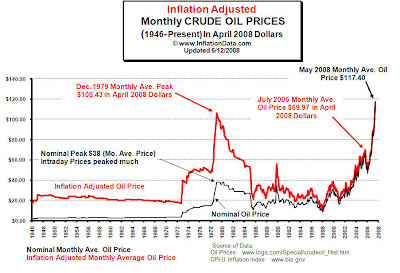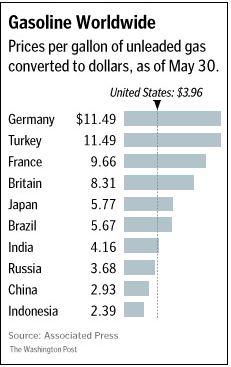
If the gold bugs are right, why hasn't gold rocketed already? Maybe
this presentation by Frank Veneroso, dated May 2001, explains it. It makes the case that there is more demand for gold than is officially recognised. This demand cannot be fully satisfied from the declining yields of gold mines, or reusing scrap.
Veneroso thinks that central banks have loaned out or sold much more gold than they admit. The World Gold Council states 30,374 tonnes in holdings (June 2007). This is down from the nearly 33,000 in mid-2001 when Veneroso was speaking, and even at that time he estimated 10,000 - 16,000 tonnes out on loan. Much of this will have ended up on ears, fingers and necks.
This theory of market intervention by surreptitious supply, implies that banks must eventually run down their stocks and be unable to continue with this tactic.

Veneroso speculated:
"If the official sector is rational, it knows what will happen to the gold price when this large flow that is depressing the price abates and ultimately ends---the price will go up by a lot. Therefore, some rational central banks will not sell and lend down to the last ounce. Instead they will start to buy. So regardless of what has been happening in the gold market, if our data is correct, then, within a couple of years, whatever the official sector is doing, it will terminate and the gold price will rise."His prediction was correct: gold has doubled in value since 2005. But as demand continues to grow over time, against a more limited supply, we should see further gold appreciation, which is what Marc Faber has predicted.
But some would go much further - Doug Casey, for instance. If we see the emergence of a very strong currency run by a country or cartel that controls a vital commodity like oil, the inflation in all fiat currencies will be cruelly exposed by contrast. Is it not possible that some might seek to use gold, in conjunction with other commodities, as an economic weapon?
And is it not interesting that the world's second largest gold hoarder, Germany, has disposed of hardly any of its stock in the last 7 years, when the average official reduction has been about 9%? Maybe Germany is taking a longer view and rather than buying gold, is being more discreet and simply not selling it. I wonder how much of its own stock Germany has loaned out?
UPDATEPlease see Monday's essay by
James Turk, on Financial Sense. He thinks that the market must ultimately win against the official manipulators.
 - Mr Straw communicated via a third party with the PM on oil-for-Lockerbie-bombers (or, the PM raised the matter with others)
- Mr Straw communicated via a third party with the PM on oil-for-Lockerbie-bombers (or, the PM raised the matter with others)





